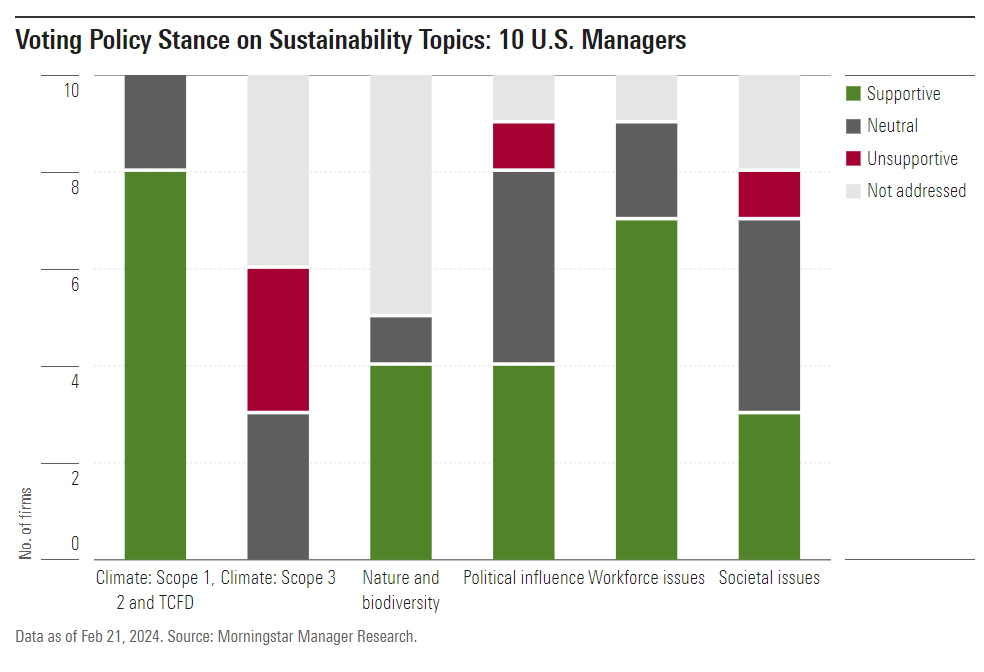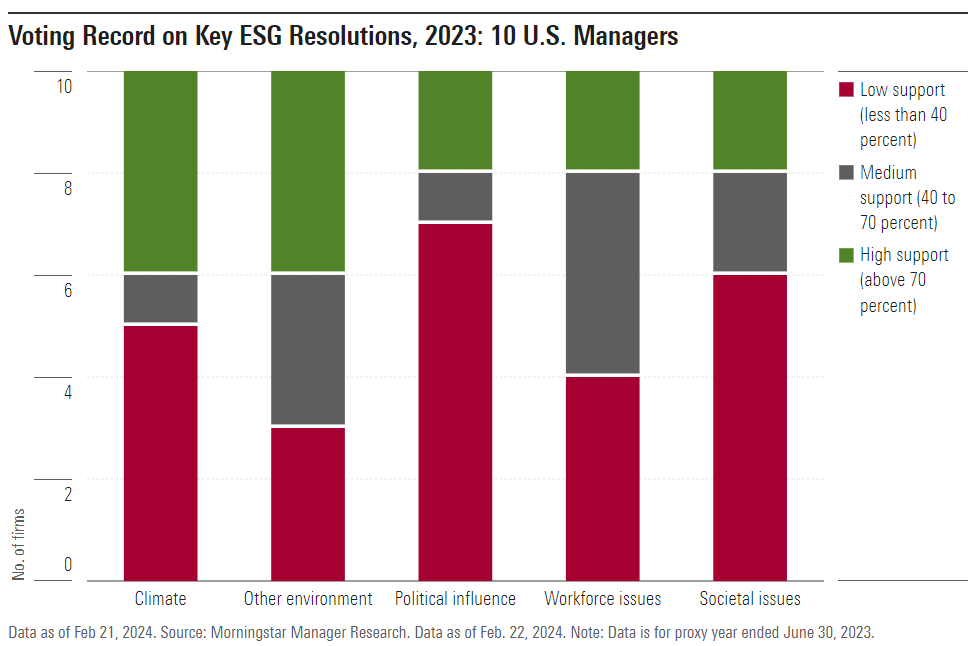:quality(80)/cloudfront-us-east-1.images.arcpublishing.com/morningstar/JYU7J2N6RRG4ZFKWVCBSBFME4A.png)
The 2024 proxy season is set to kick off in earnest. Our latest analysis of fund managers’ current proxy-voting policies, compared with their recent voting records, suggests that their votes on environmental and social topics will continue to diverge, and the falling overall support for ESG-focused resolutions will continue.
That said, voting policy wording doesn’t always make it obvious what kind of stance a manager will take. Investors are supporting better disclosure of sustainability risks and opportunities.
In our latest research paper, we reviewed the voting policies of 10 large US managers: BlackRock, Capital Group, Dimensional, Fidelity, Franklin Templeton, Invesco, J.P. Morgan, State Street, T. Rowe Price, and Vanguard—looking for evidence of potential support for ESG-focused resolutions.

Looking across the key topics of climate change, nature and biodiversity, political influence, workforce issues, and wider societal issues, we found several areas in which large US asset managers used policy language that indicates support for better disclosure of sustainability risks and opportunities.
The areas of greatest policy agreement between the managers appear to be on core climate disclosures like scope 1 and 2 greenhouse gas emissions (that is, those generated by a company’s direct operations and energy usage) as well as reporting on workforce composition and fair treatment.
Disclosures about scope 3 GHG emissions (those generated by the goods and services that a company produces or uses) remain an area of significant contention among managers. Managers including BlackRock, T. Rowe Price, and Dimensional express doubt over whether such emissions can be reliably calculated, or in some cases, even whether they can be considered material to a company’s shareholders.
This matter has been in the spotlight recently. Exxon Mobil XOM commenced a lawsuit to avoid facing a shareholder resolution addressing scope 3 emissions for a third time. Meanwhile, the SEC is reported to be considering dropping proposed scope 3 disclosure requirements from its long-awaited climate rule.
All this comes against the backdrop of news from Climate Action 100+ that saw State Street, J.P. Morgan, Invesco, and Pimco exit the decarbonization-focused engagement initiative, while BlackRock reduced its participation.
Overall, the signs point to continued low to medium support among large managers for generally well-supported key ESG resolutions, as we saw last year (illustrated in the chart below).

The key lesson to observe from comparing policy language with recent voting records is that neutral language in US managers’ voting policies is usually applied conservatively. Supportive voting-policy language from managers tends to favor resolutions requesting better disclosure, rather than any specific management action on the part of the company.
However, we note that European and sustainability-conscious managers tend to take a more supportive line on environmental and social issues in their policies, and that is reflected in much higher support for key resolutions.
Overall, the current situation leaves many sustainability-conscious investors with some big decisions to make if they want to align proxy-voting decisions with their own environmental and social priorities, whether that’s considering an alternative voting policy or a change of manager.
The author or authors do not own shares in any securities mentioned in this article. This article was originally published on Morningstar.com for a U.S. audience.





:quality(80)/cloudfront-us-east-1.images.arcpublishing.com/morningstar/6ZMXY4RCRNEADPDWYQVTTWALWM.jpg)














